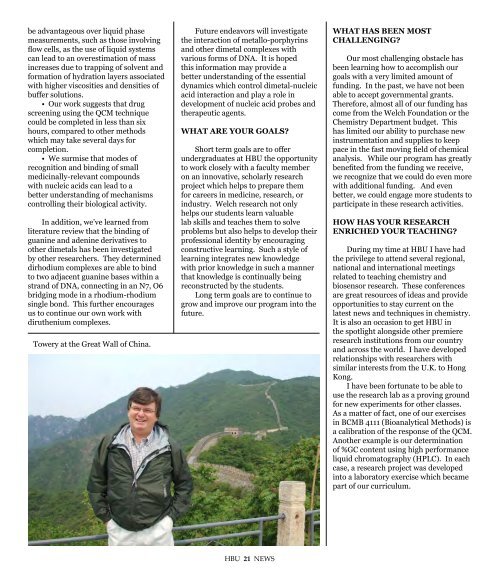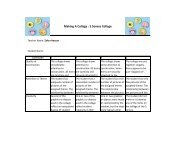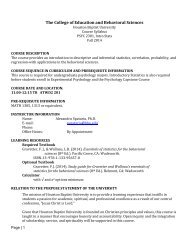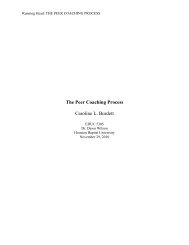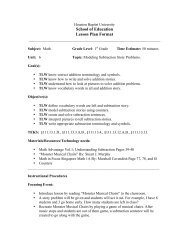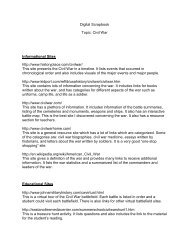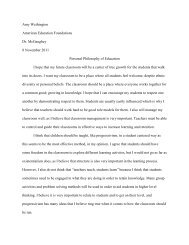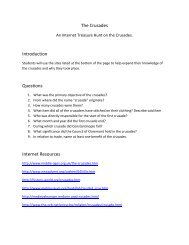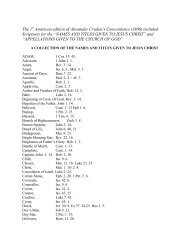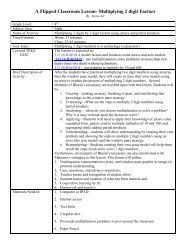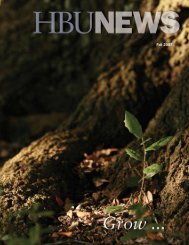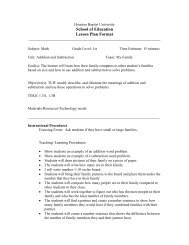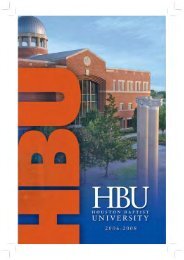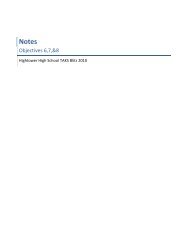Volume 46, #1 - November 2008 - Houston Baptist University
Volume 46, #1 - November 2008 - Houston Baptist University
Volume 46, #1 - November 2008 - Houston Baptist University
You also want an ePaper? Increase the reach of your titles
YUMPU automatically turns print PDFs into web optimized ePapers that Google loves.
e advantageous over liquid phasemeasurements, such as those involvingflow cells, as the use of liquid systemscan lead to an overestimation of massincreases due to trapping of solvent andformation of hydration layers associatedwith higher viscosities and densities ofbuffer solutions.• Our work suggests that drugscreening using the QCM techniquecould be completed in less than sixhours, compared to other methodswhich may take several days forcompletion.• We surmise that modes ofrecognition and binding of smallmedicinally-relevant compoundswith nucleic acids can lead to abetter understanding of mechanismscontrolling their biological activity.In addition, we’ve learned fromliterature review that the binding ofguanine and adenine derivatives toother dimetals has been investigatedby other researchers. They determineddirhodium complexes are able to bindto two adjacent guanine bases within astrand of DNA, connecting in an N7, O6bridging mode in a rhodium-rhodiumsingle bond. This further encouragesus to continue our own work withdiruthenium complexes.Towery at the Great Wall of China.Future endeavors will investigatethe interaction of metallo-porphyrinsand other dimetal complexes withvarious forms of DNA. It is hopedthis information may provide abetter understanding of the essentialdynamics which control dimetal-nucleicacid interaction and play a role indevelopment of nucleic acid probes andtherapeutic agents.WHAT ARE YOUR GOALS?Short term goals are to offerundergraduates at HBU the opportunityto work closely with a faculty memberon an innovative, scholarly researchproject which helps to prepare themfor careers in medicine, research, orindustry. Welch research not onlyhelps our students learn valuablelab skills and teaches them to solveproblems but also helps to develop theirprofessional identity by encouragingconstructive learning. Such a style oflearning integrates new knowledgewith prior knowledge in such a mannerthat knowledge is continually beingreconstructed by the students.Long term goals are to continue togrow and improve our program into thefuture.WHAT HAS BEEN MOSTCHALLENGING?Our most challenging obstacle hasbeen learning how to accomplish ourgoals with a very limited amount offunding. In the past, we have not beenable to accept governmental grants.Therefore, almost all of our funding hascome from the Welch Foundation or theChemistry Department budget. Thishas limited our ability to purchase newinstrumentation and supplies to keeppace in the fast moving field of chemicalanalysis. While our program has greatlybenefited from the funding we receive,we recognize that we could do even morewith additional funding. And evenbetter, we could engage more students toparticipate in these research activities.HOW HAS YOUR RESEARCHENRICHED YOUR TEACHING?During my time at HBU I have hadthe privilege to attend several regional,national and international meetingsrelated to teaching chemistry andbiosensor research. These conferencesare great resources of ideas and provideopportunities to stay current on thelatest news and techniques in chemistry.It is also an occasion to get HBU inthe spotlight alongside other premiereresearch institutions from our countryand across the world. I have developedrelationships with researchers withsimilar interests from the U.K. to HongKong.I have been fortunate to be able touse the research lab as a proving groundfor new experiments for other classes.As a matter of fact, one of our exercisesin BCMB 4111 (Bioanalytical Methods) isa calibration of the response of the QCM.Another example is our determinationof %GC content using high performanceliquid chromatography (HPLC). In eachcase, a research project was developedinto a laboratory exercise which becamepart of our curriculum.HBU 21 News


